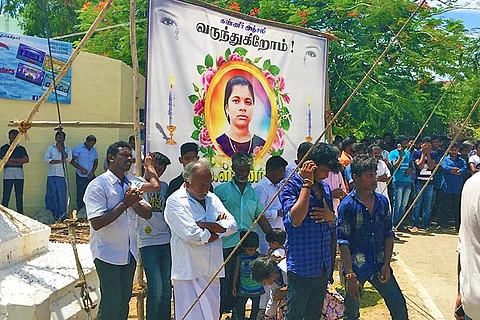

It felt almost strange to see the swelling crowd in an otherwise laidback part of Thoothukudi. A sombre silence cloaked the occasion. The body of 17-year-old Snowlin had arrived at the Sahaya Matha Church – a procession, joined by hundreds of locals, was taken out earlier, bringing her body to the church.
The Tamil version of a Bible verse soon began reverberating across the church: “Irul soozhntha pallathaakil naan nadakka nernthaalum theemai aanathu etharkum anjen (Even though I walk through the valley of the shadow of death, I will fear no evil)”.
There perhaps cannot be a verse more apt to read out at the funeral service of Snowlin – the teenager killed by the police on May 22 in a rally taken out to protest against the Sterlite Copper smelter plant.
She did not fear the ‘evil’ that was staring at her in the face. She marched ahead, raised her voice against what she thought was the evil affecting her livelihood – it did not matter that she was raising her voice against a powerful institution.
“She wanted the men in the protest to stand back because she thought the police would think twice before hitting a woman,” someone in the service says.
But what Snowlin may not have been aware of was the history of violence that Tamil Nadu has seen, and how women have been the soft targets.
When the police chased Manjolai labourers into Thamaraparani River in 1999 – for merely demanding an increase in their wages – they killed 17 labourers. Of them, two were women.
Athiyur Vijaya remains etched in Tamil Nadu’s public memory as a symbol of hegemonic violence that the state has perpetrated. As a 17-year-old in 1993, Vijaya was taken to a police station in Puducherry under the pretext of questioning her with regard to a theft. There, she was gangraped by a group of policemen. Till her death in 2014, Vijaya waged a relentless battle against the perpetrators of the crime, but met with little success.
At least 18 women were raped in Vachathi in 1992, when policemen, forest personnel and revenue officials entered the village to conduct a raid to find smuggled sandalwood.
Thoothukudi was no different.
On May 22, three women were killed in the police firing – Snowlin and Vinitha in front of the Collectorate, and Jhansi in Threshpuram later in the day. Eyewitnesses point out how the district administration was ill-equipped to handle the situation.
“The administration knew that the rally was happening and there were thousands of people marching towards the Collectorate. At every point, the crowds braved every hurdle the cops created and marched towards the Collectorate. In a sense, the crowd was led by women. There were thousands of them. But in the police force that unleashed violence on protestors, there was not a single woman,” says Kavin, a local who had participated in the protest.
When Maria Julie Hema skipped her breakfast to participate in the march on May 22, she had no idea it would change her life forever.
After walking 10 km, she reached the Collectorate. But, over there, she was beaten up by the police. “They used lathis and the butt of their guns to beat me, till I fell unconscious. When I woke up I was in the hospital, bleeding profusely.”
The bleeding continued for days on end and Hema had to be shifted to a private hospital. Doctors over there have advised her to remove her uterus. “The doctors said I am too weak now, but it has to be done after a couple of months,” she says.
Was she anticipating the violence the protest saw? “Would I take him along if I did?” she shoots back, pointing to her three-year-old son. “There were many other women who came with their kids. We had given them biscuit packets and water bottles. We only wanted to request the Collector to close Sterlite down.”
Three women were killed in the violence unleashed, but thousands more have been scarred by the events that day.
The young wife of Maniraj, the 25 year old killed in the police firing, is still struggling to come to terms with his death. “We got married only in February,” she says, still shaken.
“If there is one thing you can do to grant us justice, shut Sterlite down,” the women of Periyanayagapuram emphatically declare. “Our women have anyway been affected by cancer and fertility issues. We believe Sterlite is the reason behind it. Even in the march, the women had participated in large numbers and had borne the brunt of police violence. Anything less than permanently shutting down Sterlite will be belittling their sacrifices.”
For these women fear no evil, even as they walk in the valley of the shadow of death.